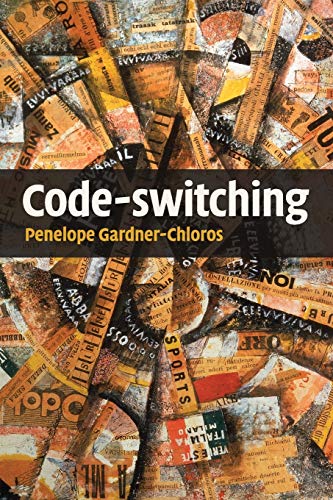code switching paperback de gardner chloros penelope (2 resultados)
ComentariosFiltros de búsqueda
Tipo de artículo
- Todos los tipos de productos
- Libros (2)
- Revistas y publicaciones (No hay ningún otro resultado que coincida con este filtro.)
- Cómics (No hay ningún otro resultado que coincida con este filtro.)
- Partituras (No hay ningún otro resultado que coincida con este filtro.)
- Arte, grabados y pósters (No hay ningún otro resultado que coincida con este filtro.)
- Fotografías (No hay ningún otro resultado que coincida con este filtro.)
- Mapas (No hay ningún otro resultado que coincida con este filtro.)
- Manuscritos y coleccionismo de papel (No hay ningún otro resultado que coincida con este filtro.)
Condición
- Todos los libros
- Nuevos (2)
- Antiguos o usados (No hay ningún otro resultado que coincida con este filtro.)
Encuadernación
- Todas
- Tapa dura (No hay ningún otro resultado que coincida con este filtro.)
- Tapa blanda (2)
Más atributos
- Primera edición (No hay ningún otro resultado que coincida con este filtro.)
- Firmado (No hay ningún otro resultado que coincida con este filtro.)
- Sobrecubierta (No hay ningún otro resultado que coincida con este filtro.)
- Con imágenes (No hay ningún otro resultado que coincida con este filtro.)
- No impresión bajo demanda (2)
Idioma (1)
Precio
- Cualquier precio
- Menos de EUR 20 (No hay ningún otro resultado que coincida con este filtro.)
- EUR 20 a EUR 45 (No hay ningún otro resultado que coincida con este filtro.)
- Más de EUR 45
Gastos de envío gratis
- Envío gratis a España (No hay ningún otro resultado que coincida con este filtro.)
Ubicación del vendedor
Valoración de los vendedores
-
Code-switching (Paperback)
Publicado por Cambridge University Press, Cambridge, 2009
ISBN 10: 0521681138 ISBN 13: 9780521681131
Idioma: Inglés
Librería: CitiRetail, Stevenage, Reino Unido
EUR 81,83
Convertir monedaEUR 35,58 gastos de envío desde Reino Unido a EspañaCantidad disponible: 1 disponibles
Añadir al carritoPaperback. Condición: new. Paperback. It is quite commonplace for bilingual speakers to use two or more languages, dialects or varieties in the same conversation, without any apparent effort. The phenomenon, known as code-switching, has become a major focus of attention in linguistics. This concise and original study explores how, when and where code-switching occurs. Drawing on a diverse range of examples from medieval manuscripts to rap music, novels to advertisements, emails to political speeches, and above all everyday conversation, it argues that code-switching can only be properly understood if we study it from a variety of perspectives. It shows how sociolinguistic, psycholinguistic, grammatical and developmental aspects of code-switching are all interdependent, and findings in each area are crucial to others. Breaking down barriers across the discipline of linguistics, this pioneering book confronts fundamental questions about what a 'native language' is, and whether languages can be meaningfully studied outside of the individuals who use them. This book focuses on the phenomenon of code-switching, whereby bilingual speakers effortlessly use two or more languages, dialects or varieties in the same conversation. Drawing on a diverse range of examples it argues that code-switching can only be properly understood if we study it from a variety of linguistic perspectives. Shipping may be from our UK warehouse or from our Australian or US warehouses, depending on stock availability.
-
Code-switching (Paperback)
Publicado por Cambridge University Press, Cambridge, 2009
ISBN 10: 0521681138 ISBN 13: 9780521681131
Idioma: Inglés
Librería: Grand Eagle Retail, Fairfield, OH, Estados Unidos de America
EUR 73,45
Convertir monedaEUR 66,09 gastos de envío desde Estados Unidos de America a EspañaCantidad disponible: 1 disponibles
Añadir al carritoPaperback. Condición: new. Paperback. It is quite commonplace for bilingual speakers to use two or more languages, dialects or varieties in the same conversation, without any apparent effort. The phenomenon, known as code-switching, has become a major focus of attention in linguistics. This concise and original study explores how, when and where code-switching occurs. Drawing on a diverse range of examples from medieval manuscripts to rap music, novels to advertisements, emails to political speeches, and above all everyday conversation, it argues that code-switching can only be properly understood if we study it from a variety of perspectives. It shows how sociolinguistic, psycholinguistic, grammatical and developmental aspects of code-switching are all interdependent, and findings in each area are crucial to others. Breaking down barriers across the discipline of linguistics, this pioneering book confronts fundamental questions about what a 'native language' is, and whether languages can be meaningfully studied outside of the individuals who use them. This book focuses on the phenomenon of code-switching, whereby bilingual speakers effortlessly use two or more languages, dialects or varieties in the same conversation. Drawing on a diverse range of examples it argues that code-switching can only be properly understood if we study it from a variety of linguistic perspectives. Shipping may be from multiple locations in the US or from the UK, depending on stock availability.


